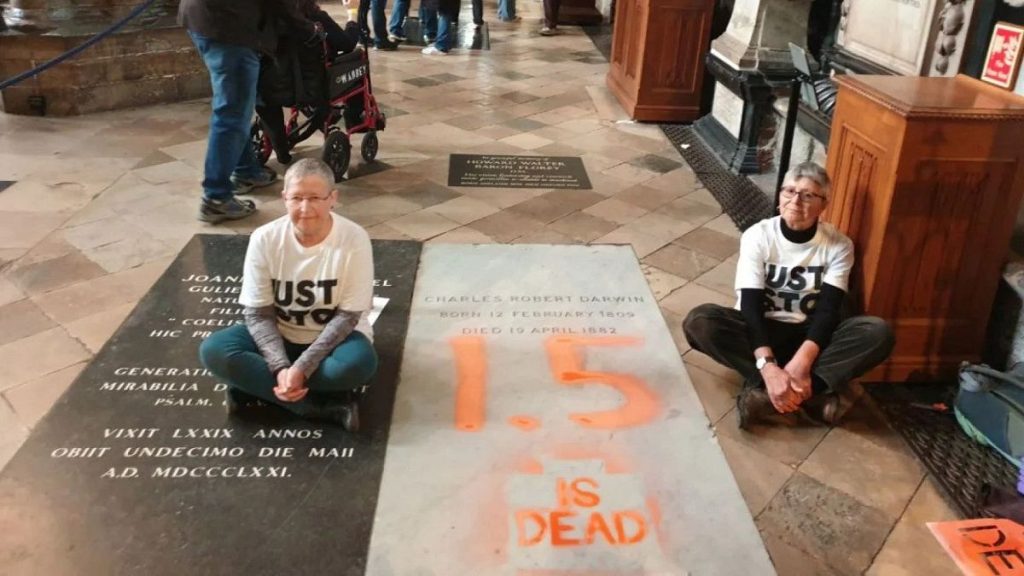The Desecration of Darwin’s Grave: A Symbolic Act of Climate Protest
Two climate activists affiliated with Just Stop Oil, Alyson Lee and Di Bligh, shocked onlookers and sparked controversy by spray-painting Charles Darwin’s grave at Westminster Abbey in London. Their act, which involved scrawling "1.5 is dead" on the renowned naturalist’s final resting place, was a direct response to recent climate reports confirming 2024 as the hottest year on record, exceeding the crucial 1.5°C threshold above pre-industrial levels. The activists argued that Darwin, a meticulous scientist, would have been appalled by the ongoing sixth mass extinction and the government’s inaction on climate change. They believed their act of protest, though unconventional, was necessary to awaken public awareness and pressure authorities to address the climate crisis. This incident highlights the growing frustration and desperation among climate activists who perceive a lack of urgency and adequate response from governments in the face of escalating environmental threats.
Just Stop Oil: A Coalition of Climate Activists Challenging the Fossil Fuel Industry
Just Stop Oil, a coalition of environmental organizations, is at the forefront of climate activism in the United Kingdom. Founded in 2022, the movement’s primary objective is to halt the British government’s approval of new oil projects. They advocate for a transition to renewable energy and improved energy efficiency in buildings, emphasizing the urgency of reducing reliance on fossil fuels. Just Stop Oil’s activism has involved disruptive tactics, including targeting iconic artworks, historical sites, and even the private jet of pop star Taylor Swift. Their justification for these actions lies in the belief that disrupting normalcy and challenging comfort zones is essential to raise public consciousness and force dialogue on climate change.
The Significance of the "1.5 is Dead" Message:
The message "1.5 is dead," painted on Darwin’s grave, refers to the internationally recognized goal, established in the Paris Agreement, to limit global warming to 1.5°C above pre-industrial levels. This target is considered crucial to prevent the most catastrophic consequences of climate change, including widespread sea-level rise, extreme weather events, and biodiversity loss. The activists’ declaration of "1.5 is dead" reflects the grim reality that this target has been breached, signaling the increasingly dire consequences of inaction. It serves as a stark reminder of the urgent need for immediate and drastic measures to curb greenhouse gas emissions and mitigate the impacts of climate change.
The Ethical Dilemma of Disruptive Activism:
Just Stop Oil’s tactics, including targeting artworks and cultural heritage sites, have sparked both support and condemnation. While some applaud their commitment and the urgency of their message, others criticize their methods as disrespectful and counterproductive. The desecration of Darwin’s grave highlights the ethical complexities of disruptive activism. While intended to raise awareness and provoke action, such acts risk alienating potential allies and overshadowing the core message. The debate surrounding the effectiveness and appropriateness of these tactics underscores the challenges of navigating the complex landscape of climate activism.
The Legacy of Charles Darwin and the Sixth Mass Extinction:
Charles Darwin, renowned for his theory of evolution by natural selection, revolutionized our understanding of the natural world. His work emphasized the interconnectedness of species and the importance of adaptation for survival. The activists’ invocation of Darwin in their protest underscores the stark irony of the current environmental crisis. The sixth mass extinction, driven by human activities, represents a profound failure to safeguard the biodiversity that Darwin so meticulously documented and analyzed. The activists’ message suggests that Darwin, a champion of scientific observation and understanding, would be deeply troubled by the current trajectory of human-induced environmental destruction.
The Urgency of Climate Action in a Warming World:
The actions of Just Stop Oil, while controversial, highlight the growing desperation among climate activists in the face of escalating environmental challenges. The breaching of the 1.5°C warming limit signals the urgent need for immediate and decisive action to curb emissions and transition to a sustainable future. The debate sparked by their tactics is a reminder of the complex challenges inherent in climate activism and the need for innovative and effective strategies to mobilize public and political will. As the impacts of climate change intensify, the question of how to effectively advocate for change will become increasingly pressing. The desecration of Darwin’s grave, while a symbolic act, underscores the profound urgency of addressing the climate crisis and protecting the planet for future generations.














